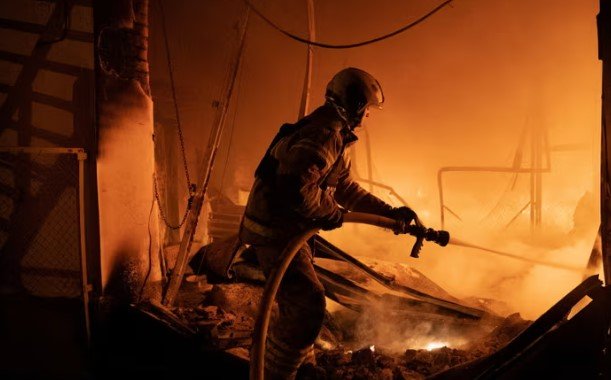New glimpses of hope arise concerning the talks about Ukraine as aggressiveness deepens along the frontlines.
London, April 23, 2025 – While Russian attacks intensify over southeast Ukraine, senior officials from the United States and European Union have stepped into London for another round of peace discussions. These are aimed at devising a strategy to end the war, which has been ongoing for over two years. This latest diplomacy effort, one that NATO and UN watchers support, comes as the fighting continues to wreak havoc on Ukrainian infrastructure, disrupt civilian life, and destabilize the region.
The discussions, which will take place behind closed doors at Lancaster House, a renowned diplomatic site located in Central London, are viewed by some commentators as the most synchronized Western peace effort in over a year.
A Moment for Diplomacy
Outstanding representatives, e.g., US Secretary of State Linda Prescott and EU foreign policy chief Josep Borrell, will attend the functions, and this emphasizes the urgency of this particular effort. Both voices coming from Kyiv and Moscow depict some form of war fatigue, thus granting leeway to Western forces who are advocating for cryogenically preserving Ukraine’s integrity while giving Russia a way out of relentless diplomatic excommunication.
Speaking of the “exploration of pragmatic steps towards de-escalation,” Helen Duncan, Britain’s Foreign Secretary, stated, “practical steps have to be made from both sides. Meaningful steps towards dialogue have been successful thus far. London is ready to assist and host meaningful discussions.”
Escalating the Battlefield
The war continues to rage on unabated, even though diplomats are convening in London. Over the last weekend, Russian troops decimated Kharkiv and Dnipro with incessant missile strikes that killed more than 28 civilians and injured many more. Attacks on these regions are being conducted at a time when Russian soldiers are also trying to extend their reach into the Donetsk and Zaporizhzhia regions, which are currently under Ukrainian control.
Unsupported by Western military reserves, the Ukrainian armed troops sustained further offensives. Although one military analyst posits that these hostile acts are merely an advanced strategy Russia is using to gain influence during the negotiations.
In the statement, General Andriy Syvachenko, a senior commander in the east of Ukraine, noted: “Putin seeks to negotiate from the apex of power. These attacks are not only tactical, but also psychological maneuvers intended to disrupt our coherence and determination.”
The Structure of the Proposed Framework For Peace: A Sophisticated Labyrinth
As noted by some of the sources that are privy to the talks, the conversations in London will focus on several important issues: setting international borders, future referendums in contested areas under international supervision, humanitarian corridors, and security assurances for Ukraine.
According to European diplomats who received an early draft proposal, some occupied territories would see a phased withdrawal of Russian troops, which would be conditional on the relaxation of some economic sanctions. Other talks suggest bolstering UN peacekeeping forces in areas adjacent to the conflict zone.
However, some NATO members are skeptical about what Russia is trying to achieve. One French diplomat spoke under the condition of anonymity, stating, “Moscow has developed a reputation for agreeing to ceasefires and subsequently breaching them. We require strong assurances and reliable, verifiable systems.”

Red Lines for Ukraine
Although President Volodymyr Zelenskyy is not present at the negotiations taking place in Warsaw, he expressed that there would need to be a complete de-occupation along with the restoration of Ukraine’s borders for any agreement during his frequent updates.
Addressing the parliament virtually, he said, citing, “We will not barter our sovereignty for short-term peace.”
In the Bolzano Summit, Zelenskyy stated that he supports Ukraine’s claim for tightening long-term NATO security assurances along with postwar funding, which is projected to surpass $500 billion.
Split Messages and Russian Signals
Though no official representatives are sent by Russia to the London meetings, it is understood that Kremlin-associated interlocutors maintain some degree of contact with Western negotiators surreptitiously through middlemen from Turkey and the UAE.
According to President Vladimir Putin, who spoke on Russian television recently, states, “Russia is open to dialogue,” he refuses to negotiate on “national security or the will of people in the liberated regions,” however.
Western officials believe these comments were directed at regions of Russia-occupied Ukraine, notably Luhansk and Donetsk, where Russia has conducted highly disputed referendums purporting that local populations wanted to be incorporated into the Russian Federation.
In the U.S. and across Europe, the order to resolve the warfare is becoming more common, and recently, public opinion favors an end to the military intervention in Ukraine. Most-deficient and war-torn nations, including Germany and Italy, are beginning to withdraw their support for the conflict.
Poland is concerned for Ukraine too, but in another manner, as its political stance has to deal with the lack of support for the pro-Ukrainian agenda within the congress. Behind closed doors, moderate democrats argue that Ukrainian support may be necessary down the line, but it can be revised for long-term strategic reasons.
Whitman is angry and is under a conservative wing’s scrutiny, and furious with the heavy stacking of progressives against him on the global front, and leading unyielding support for Ukraine. The implied message of the White Administration is South Front-Rule Territory is hard ostracized and imposed negation that fulfills.
In the midst of a press conference with Canada’s Prime Minister, President Whitman addressed the violent dispute. “Endless war is not the answer. But, neither is appeasement.”
The Global South and the Role of the United Nations
To devise a more equitable strategy, the UN sent envoy Maria Cortez of Brazil, who has mediated other regional disputes, to alleviate the conflict. A few countries from the Global South, India, South Africa, and Indonesia, are interested in participating as neutral observers to this dispute and other future discussions.
UN Secretary-General António Guterres released a statement supporting all sides of the London Initiative while calling for swift action as he emphasized the importance of peace for the region. “I implore all concerned stakeholders to embrace the prospect of peace with courage and compassion.”
What happens next?
If no new disputes arise, the London peace talks are hoping for a minimum of five days of discussions. Based on how the first round progresses, a second round could be held in Geneva or Vienna. Any provisional agreements that arise will set the stage for a more comprehensive international Ukraine summit, likely to be hosted by Switzerland or the Vatican later this year.
But skepticism is placed on following optimism. “Diplomacy is a marathon, not a sprint,” said Dr Eva Martins, who is a senior fellow at the European Council on Foreign Relations. “This is just the first stage of a very long road.”
Table of Contents
Deflated Aspirations, Intensifying Interests
While sirens continuously echo in Ukraine, and families are forced to dig graves for their loved ones, the rest of the globe includes London in their sight with a cautious smile. London, simultaneously, is expectedly to be held in awe and paranoia. With it comes the hope and fear blend cocktail. Waged human lives, alongside national alliances, pose frozen dangers in the context. Executed decisions in the immediate future will either welcome the conflict temporarily or extend the inflammation curse forever.



